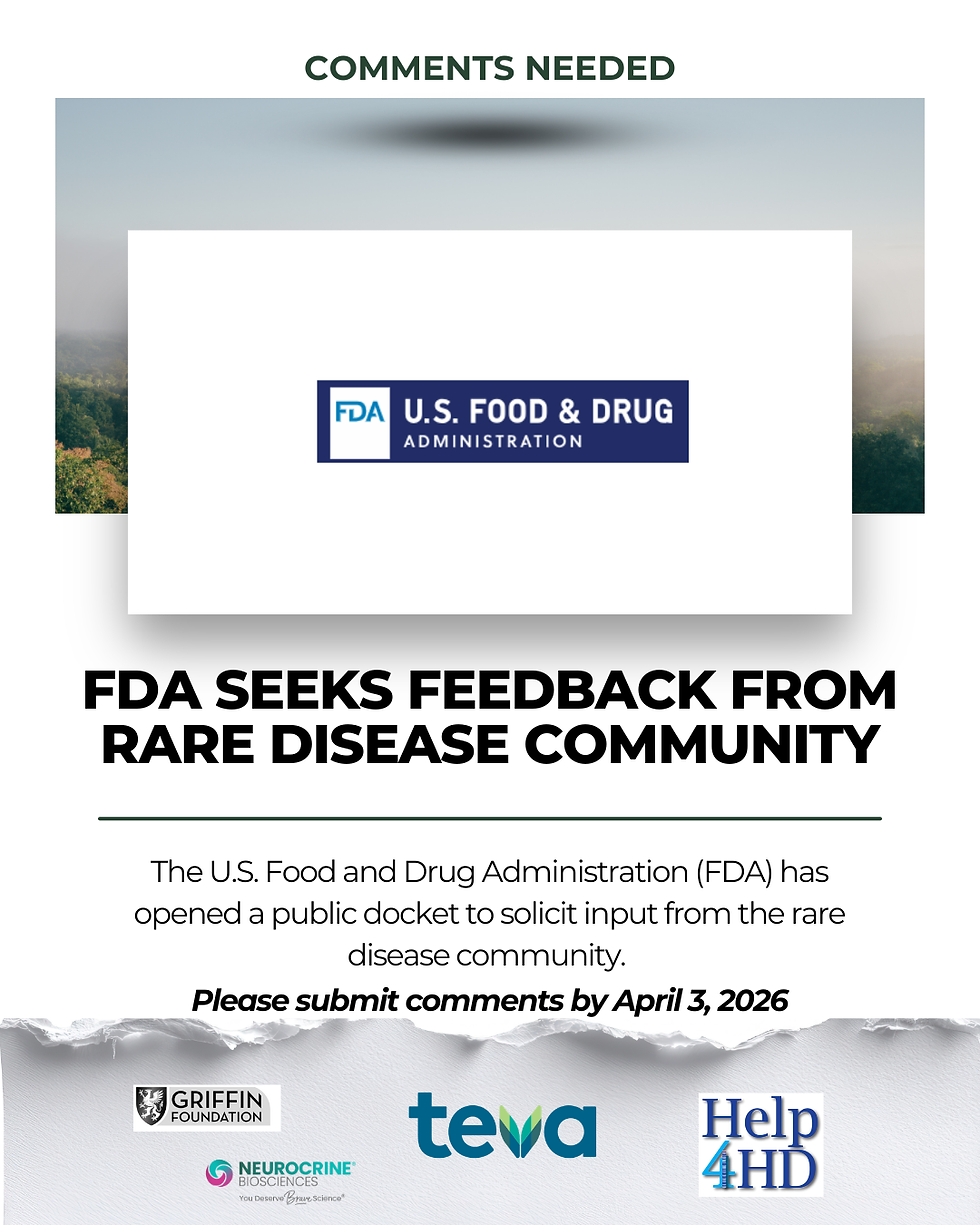Testing, what to do first; words from the community.
- katrina4384
- Jul 6, 2023
- 4 min read

We asked our social media followers, 'What is one thing you should do before getting tested?' the discussions were great!
One of the very first comments was, "Life insurance." As a community, we have been forced to plan every aspect of our testing journey to ensure we don't face repercussions. Life insurance is a tool that can help someone with HD, their family, and friends who support them have a cushion of support when needed.
Here is a link to Davan Johnson speaking about HD specific Life insurance and just how important it is: (13) Life Insurance - YouTube
Davan also has a resource page on his website to help families with Huntington's disease, specifically with navigating life insurance and other important insurances/topics: HD RESOURCE PAGE | Bristol, TN | Davan Enterprises Insurance Agency
Another great comment that came in discusses your support during the testing process, "Think carefully about who you want to tell- because they’ll all be expecting an answer after your test. Also, consider who you’ll bring to the appointment. Will they be able to support you, or will they need you to support them? Do they have their own support system in place?"
Testing is complex, no matter who you are or your family history. When you first decide to test (and even prior while deciding), it is extremely important to have a support person and, ideally, a supportive group of people to walk alongside you. Sometimes, this isn't the case, but you are always welcome to reach out to advocacy groups like Help4HD - we are all directly impacted by Huntington's disease and Juvenile Huntington's disease, as well as HD Reach, HDYO, NYA, etc., to ask for support.
This comment raises a good point; when you tell someone you will be taking the genetic test for HD, they will also expect to hear your results. Thinking ahead about these conversations and outcomes is essential for you and them. This is a "you" decision where you are the one who needs to decide how you would like to be supported and by whom.
This response is a great way to prepare for the unknown. "Thinking about all the different scenarios so your expectations are all properly set with possible outcomes!"
With genetic testing for HD, some variables are not as easy as saying yes, you have HD, or no, you do not. When you receive your results, you may be told you are negative and will not develop Huntington's disease. Some people outside of our community may suggest that this is not problematic for people, but it does carry weight for things like depression, survivor's guilt, and the 'why me'? feelings, etc. If you test positive for gene expansion, many questions arise, but most want to know their CAG repeat number. A suggestion by a community member who tested positive: "Write everything down that you would like to discuss. When you are in a doctor's office, oftentimes, you are trying to remember every reason why you are there in the first place. Add on a very emotional appointment, and you can easily fall silent". Another possible result is testing in the 'gray area,' which can be confusing and is one topic many people don't know much about unless they have been a part of the HD/JHD community for some time. Here is an excellent article from HD Buzz that outlines CAG repeats and, more specifically, highlights the 'gray area':
The genetic 'gray area' of Huntington's disease: what does it all mean? - HDBuzz - Huntington’s disease research news. Beyond testing negative, positive, or in the 'gray zone,' there is the Juvenile form of HD. When symptoms of this disease appear before the age of 20, they are said to have the Juvenile form of Huntington's disease, which is extremely rare and more rapidly progressive than adult onset. An older article, but still relevant and simplistic: Kids sometimes get Huntington’s disease too - HDBuzz - Huntington’s disease research news. Here is the first JHD Documentary about Juvenile HD with difficult-to-watch videos of children; please be advised: Vimeo
Mindset is important; genetic counselors do a great job discussing many subjects about testing before getting tested and after receiving your results. This community member shared how they approached testing: "The results will be what they will be. Your genes are set at birth. Getting the results is just information. That helped it not feel as traumatic for us because it wasn’t like he suddenly acquired the disease, just that we became aware of it."
One thing that the HD and JHD community has talked a lot about and seem to agree on generally is choice. "Test when you are ready; this is something that is so personal. Take your time, and have your supports in place." The reality is, with Huntington's disease, your CAG will always be available to test. Planning, preparing, and being 'ready' is imperative. "There are different ways to test - you can test at a center of excellence, with your local neurologist, and now at home using services like HD Genetics. Look at your options and what feels right to you!" Testing looks different in everyone's mind who is deciding on making that next move. Some have huge families where most members test similarly with the same doctors, etc. Some individuals have horror stories of how their loved ones' results were delivered and want a different option and experience. Regardless, there are options, and researching how testing looks to you will likely help shape how you feel while going through this part of your journey. The option mentioned in this comment is less known by our community, and more information can be found here: HD Genetics Best-In-Class Genetic Testing & Counseling





Comments